When I started WPBeginner, I had already been using WordPress for years. To this day, I truly believe it’s the best blogging platform out there. Otherwise, I wouldn’t have dedicated over a decade to writing this blog!
But I know not everyone shares this view. Many people often wonder: “Which blogging platform is the best for my specific situation?” As someone dedicated to helping others succeed online, I make it my priority to always stay up-to-date with all the latest industry trends.
That’s why I regularly test other popular blogging platforms and website builders. I carefully compare them against WordPress and each other to bring you well-rounded, truly up-to-date advice.
Curious about my findings? You’re in the right place! In this article, I’ll walk you through my expert comparison of today’s top blog platforms, based on my extensive, hands-on experience.

How I Picked the Best Blogging Platforms
I’ve personally seen a lot of blogging platforms come and go over the years. In my experience, there are several distinct factors that truly set the best blog platforms apart from the rest.
That said, here’s the checklist I personally use when evaluating each blogging platform:
- Ease of Use: I always look at how quickly you can set up a blog on the platform. The user interface should be intuitive, requiring absolutely no coding skills for essential operations. The best blog platforms make it easy to get started.
- Value for Money: I carefully assess the features included in each pricing tier. It’s also important to consider the long-term costs as your blog grows. The availability of free plans or trials is always a big plus in my book.
- Blogging Features: The quality of the content editor is incredibly important. I also thoroughly check for robust tools, seamless integrations, and features related to SEO, blog analytics, contact forms, and more. A comprehensive set of features is what defines a truly great blogging platform.
- Scalability: A good blogging platform should be able to grow with your blog. That said, I look for the ability to handle increasing traffic without any performance issues. The option to add advanced features is also important, as it means you won’t have to migrate your blog to a different platform later on.
How I Test and Review Tools for WPBeginner
I’m the founder of WPBeginner and have 16+ years of experience in blogging, WordPress, SEO, and online marketing. To ensure I recommend only the absolute best blogging platforms and tools to my readers, I personally test every product.
This means setting up live websites and then thoroughly evaluating each platform’s user-friendliness, customization options, pricing, performance, and overall compatibility.
My goal is always to provide you with genuinely helpful, reliable insights so you can choose the best blogging platform for your needs.
To learn more about how I select blog platforms (and other tools), be sure to check out my full editorial guidelines.
1. WordPress.org
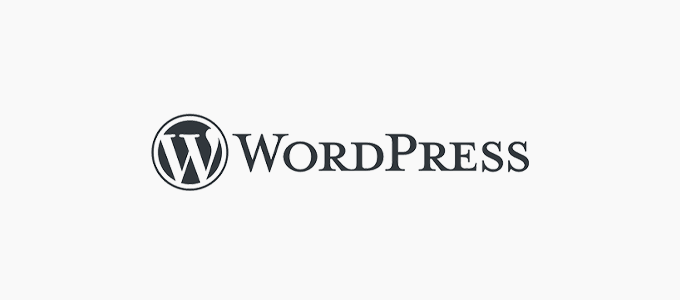
WordPress.org is the world’s most popular blogging platform, and it’s easy to see why. It now powers more than 43% of all websites on the internet, and it remains my go-to choice for the best blogging platform.
You won’t be surprised to learn that WPBeginner runs on WordPress! You can learn more about why I love WordPress so much in my full WordPress review.
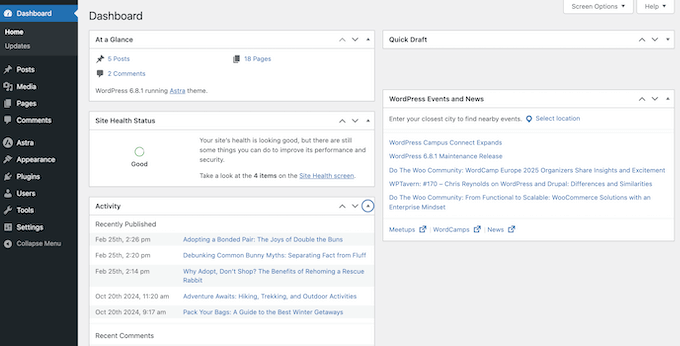
Also, please note that I’m referring to WordPress.org, not WordPress.com. WordPress.com is a separate blog hosting service that I’ll cover later in this list. For more information, see my guide on the difference between WordPress.org and WordPress.com.
If you don’t already know, WordPress.org is an open-source, free blogging platform that allows you to build your website or blog in minutes.
It is a self-hosted solution which means you’ll need to sign up with a WordPress hosting provider to use it. It’s a great option if you want to have full control over your blog’s future.
Pros
- In my opinion, WordPress.org is the best blogging platform because it’s so scalable. WordPress gives me complete control over every aspect of my sites so I can grow my online businesses with ease.
- You can add extra features like forums, online stores, and paid memberships. You can even sell online courses. This is why I consider WordPress the best free blogging platform for making money.
- There are thousands of free themes available for WordPress. This allows you to create a beautiful website that stands apart from the crowd. Most popular WordPress themes come with built-in customization options that give you full design control over colors, fonts, and more, without having to edit any CSS code.
- By choosing WordPress as your blogging platform, you’ll get access to more than 59,000 free WordPress plugins. These plugins are like apps for your WordPress blog that let you add extra features such as contact forms and galleries. To get started, see my list of must-have WordPress plugins.
- WordPress is also search engine friendly. You can easily create SEO-friendly URLs, categories, and tags for your posts. Plus, there’s a wide range of SEO plugins so you can further optimize your pages and posts, and boost your search engine rankings.
- You can easily enable Google Analytics-powered website analytics in WordPress so you can see the stats that drive real growth. This makes it easier to see what’s working, so you can do more of it and continue to grow your traffic and subscribers.
- Finally, WordPress’ drag-and-drop editor makes it easy to create any type of multimedia content on your blog. It also has options to embed dynamic content like videos, social media feeds, Google AdSense, graphs, charts, and more without needing any technical expertise.
Cons
- When I first started using WordPress, there was honestly a bit of a learning curve. This was mainly because I needed to get familiar with the WordPress administration area. But now, navigating the interface has become second nature to me.
- You will have to manage your own backups and security. (Fortunately, there are plenty of security and backup plugins that can help you with these essential tasks).
Pricing
The WordPress software is free, but you’ll need a domain name (about $14.99/year) and hosting (usually starting from $7.99/month).
A domain name and web hosting are essential for launching any type of website, including a WordPress blog.
Luckily, I have talked to the folks at Bluehost, an official WordPress-recommended hosting provider. They’re happy to give WPBeginner users an amazing deal to start a website for only $1.99 per month, which also includes a FREE domain name.
Decided that WordPress is the right blogging platform for you? Then check out my guide on how to start a WordPress blog for complete step-by-step instructions on what to do next.
Overall, WordPress is an excellent choice for both personal and professional blogs.
The majority of successful, well-known bloggers rely on WordPress as their content management system (CMS) because it’s incredibly user-friendly and has all the features you need to create and run a successful blog.
Bonus: Beyond creating a blog, you can also use WordPress to build powerful business websites, online stores, membership sites, and much more. It may be the best blogging platform, but it’s also incredibly versatile and flexible!
For more information, see my team’s detailed guide on how to make a WordPress website.
2. Hostinger Website Builder
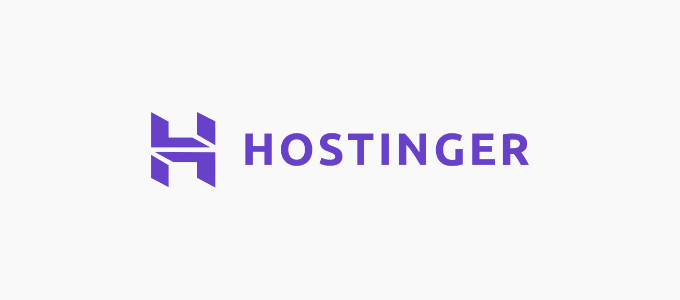
Hostinger Website Builder is an all-in-one platform for creating a blog, small business website, portfolio, or online store. It’s truly a versatile blogging platform.
Hostinger offers a unique website builder that’s powered by artificial intelligence (AI). When I was setting up my demo site, all I had to do was answer three questions, and the AI automatically built that website for me.
That included relevant text and images that I could easily customize using the drag-and-drop editor.
Hostinger is also recognized as one of the best web hosting providers on the market. In fact, I’ve covered it extensively in my Hostinger review.
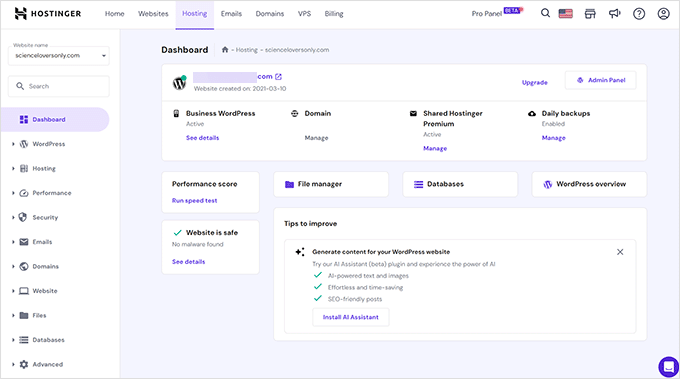
Nearly all their plans come with web hosting, a free domain name, a free business email address, and many more valuable features.
Pros
- You can quickly create a blog with the AI-powered website builder, which is a standout feature I rarely find on other blogging platforms.
- The intuitive drag-and-drop editor lets you effortlessly change formatting, add new elements, and create pages.
- Hostinger includes robust eCommerce support with over 20 payment gateways and no additional transaction fees. This makes it a strong contender for the best blogging platform for selling products.
- Built-in search engine optimization tools to improve your Google ranking.
Cons
- Hostinger lacks the wide range of third-party plugins and add-ons you get from self-hosted blogging platforms like WordPress.org.
- In my experience, switching to a new website template after you’ve already chosen one can be a challenge.
- There’s no completely free plan, but they do offer a 30-day money-back guarantee. This means you can try it out, risk-free.
Pricing
WPBeginner readers can get up to 79% off using my Hostinger coupon code. The Premium plan starts at only $2.69 per month, and it includes AI website creation, eCommerce features, and more.
For advanced features, you’ll need to upgrade to the Business plan, which starts at $3.59 per month.
If you run a small business and don’t want to use WordPress, then the Hostinger Website Builder is the next best blog platform, in my opinion.
3. Wix

Wix is a popular hosted platform for building websites. Their drag-and-drop website builder offers a fantastic solution for small businesses who need to create a professional site, fast.
I’ve found that you can seamlessly add a blog to your website using the Wix Blog app.
I’ve also created a detailed comparison of how Wix stacks up against WordPress. You can check out my Wix vs WordPress review if you want to learn more.
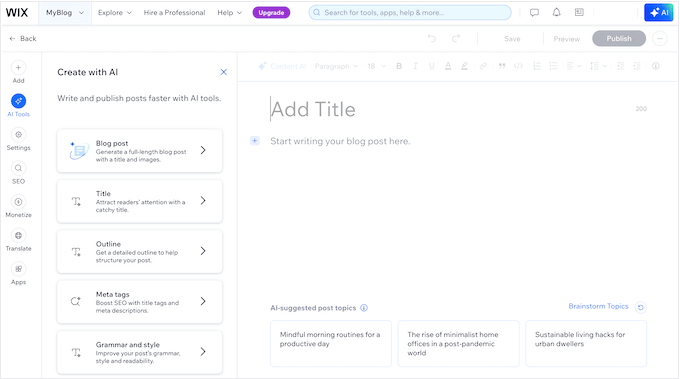
Wix.com was founded in 2006 as a platform that allowed anyone to create a stunning website without needing coding skills.
It currently has over 110 million users worldwide, making it one of the largest blogging platforms according to our CMS market share report.
Pros
- You can customize your site using a wide range of templates and third-party add-ons.
- During my testing, I found it incredibly easy to build a demo site thanks to Wix’s drag-and-drop tools. I didn’t need to write a single line of code or HTML.
- The setup process is remarkably quick and simple, so you can get your blog online right away.
Cons
- The free account is limited, and I’m personally not a fan of how it shows the Wix branding and advertisements on your blog. When a blogging platform does this, it always makes your site look less professional.
- The selection of free third-party apps is quite limited, so you may struggle to add missing features.
- Once you select a template, you can’t change it. This can become a huge problem as your blog grows and evolves, and makes it incredibly difficult to change your branding.
- eCommerce features are limited to paid plans. Even then, the features for online selling can be pretty restrictive, especially when compared to specialized eCommerce blogging platforms.
Pricing
The basic Wix website builder is free. With a free Wix account, you’ll get a Wix subdomain that looks like this: https://username.wixsite.com/example. This is a good way to test out Wix, and see if it’s the right blogging platform for you.
However, you can get a custom domain for free with their premium plans, which start at $16 per month and go up to $159 per month. Just keep in mind that the standard domain renewal fees will apply after the first year.
4. HubSpot CMS

HubSpot CMS Hub is a powerful, all-in-one blogging platform designed for websites of all sizes, from small businesses to large enterprises.
It’s built on top of HubSpot’s marketing and CRM tools, so you can use a single platform to create a professional website, get more subscribers, send newsletters, manage your customer list, and more.
I’ve personally experienced how easy the HubSpot platform is to use. You can check out our detailed HubSpot review for more information about that.
HubSpot’s intuitive website builder lets you easily customize your website’s design and layout. What’s truly remarkable is that you can even personalize the content readers see based on their past behavior, creating a highly engaging experience for your audience.
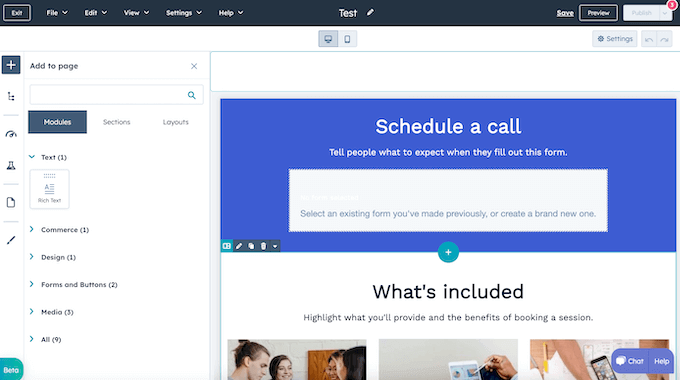
Pros
- HubSpot offers an easy-to-use drag-and-drop website builder that requires no coding skills whatsoever, so it’s accessible to everyone.
- Setup is quick and simple, as HubSpot provides managed hosting for your website. This means they handle all the technical tasks for you.
- It comes fully optimized for SEO and conversions right out of the box, helping your blog perform effectively from the start.
- A free SSL (Secure Sockets Layer) is included. This is a security protocol that encrypts data between a user’s browser and a website. Basically, it helps you ensure sensitive information stays private and isn’t intercepted by hackers. An SSL certificate is absolutely essential if you plan to accept credit card payments in WordPress.
Cons
- While the HubSpot CRM itself comes with free tools (like contact management, email marketing, and forms), there isn’t a free version of the core content management system.
- Pricing can be steep for higher-level plans. This can make it more difficult to grow your WordPress blog.
- If you’re moving from another blogging platform, then the migration process may be lengthy, depending on the complexity of your previous provider and content.
Pricing
The HubSpot CMS plan starts at $25 per month. This entry-level tier includes all the main features you need to establish a secure, well-designed blog, along with the marketing tools you’ll need to grow it.
For the custom SEO recommendations and advanced features, you may need to upgrade to the higher tiers. This is something to keep in mind, when deciding whether HubSpot CMS is the right blogging platform for you.
Want to try HubSpot out? WPBeginner readers get a free 14-day trial, so you can see whether it’s the best blog platform for you.
⭐ Why not combine the power of the world’s best blogging platform (that’s WordPress) with HubSpot’s marketing tools?
The free HubSpot plugin lets you use a single, unified platform to effortlessly create a professional blog, attract more subscribers, send targeted newsletters, efficiently manage your customer list, and much more.
5. WordPress.com

WordPress.com is a well-known blog hosting service offered by Automattic, a company created by WordPress.org co-founder Matt Mullenweg.
The best way I can describe WordPress.com is it’s like a simplified version of WordPress.org that conveniently includes free blog hosting services.

That said, you can purchase additional options like a custom domain name, additional storage, and other premium services to enhance your blogging platform.
Started in 2005 with a goal to bring the WordPress experience to an even wider audience, WordPress.com is a good blogging site for users who don’t want the advanced features of self-hosted WordPress.
Pros
- No setup required, making it incredibly easy to get your blog online quickly.
- Easy to use and manage, which is perfect for beginners.
- It’s completely free if you’re happy with a WordPress.com subdomain. Your free website name will look something this: https://example.wordpress.com.
Cons
- In my opinion, the biggest drawback of WordPress.com is the incredibly limited options you have to extend and customize your site. You simply cannot use custom themes and powerful third-party plugins to truly personalize your blog.
- You can’t run advertisements on your blog. Instead, WordPress.com will display its own ads on your free website, which isn’t ideal for monetization.
- You do not own your blog, and WordPress.com can suspend your account if they think you’re violating their terms of service. This means less long-term control over your blogging platform.
Pricing
The basic WordPress.com account is free, but it will prominently feature WordPress.com ads and branding.
You can upgrade to their Personal plan for $4 per month (billed yearly) to remove the WordPress.com logo and advertising from your website. You’ll also get a custom domain (such as www.yoursite.com).
For $8 per month (billed yearly), you can unlock additional design tools and extra storage.
⭐ By using our WordPress.com discount, you can get 50% off the Business, eCommerce, and Enterprise plans for the first year.
Because of the similarity in names, I’ve noticed that beginners often start with WordPress.com, thinking they’re getting the powerful WordPress.org software.
After seeing the limitations, these people often end up switching from WordPress.com to WordPress.org so they can unlock extra features and get full control over their blogging platform.
6. Network Solutions Website Builder
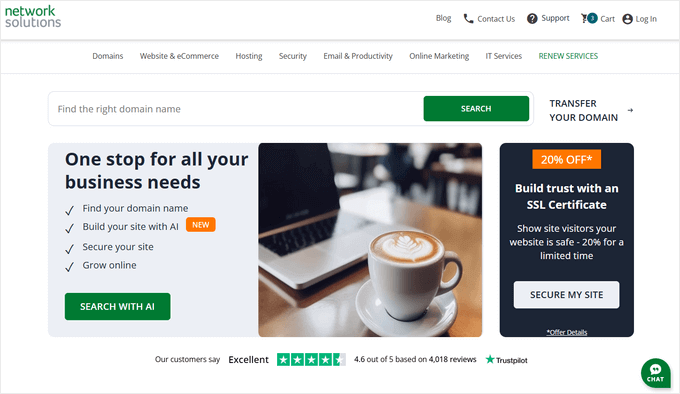
Network Solutions offers a website builder platform that lets you add a blog section to your business website or online store. It’s designed to be a straightforward solution and user-friendly blogging platform.
I’ve found their drag-and-drop website builder platform to be extremely easy to use for non-technical users. They also offer very affordable prices, with plans starting at just $1.99 per month.
You can choose from tons of ready-made templates and then customize your blog layout precisely, all without writing any code.

Network Solutions comes with all sorts of powerful features like SEO tools, blog security features, autosave and backup, website analytics, and much more.
Pros
- Beginner-friendly drag-and-drop website builder (no coding needed).
- Dozens of fully customizable templates for your blog.
- Easy setup since Network Solutions manages all the technical details of hosting your website for you.
- Affordable starting prices – $1.99 per month, which includes all the essential features you’ll need to launch your blog.
- Free domain is included with all paid plans, adding even more value.
- 24/7 customer support is available via phone, live chat, and email.
Cons
- The extensions/app ecosystem is small. This means there isn’t the same variety of third-party plugins available on other blogging platforms, like WordPress.
- Blogging features are nowhere near as powerful as some other blog platforms, particularly WordPress. This is a key consideration for serious bloggers.
- Since Network Solutions is a proprietary website builder, switching your website to another platform later can be challenging.
Pricing
Network Solutions pricing starts at $1.99 per month for their Website plan. This plan includes their intuitive drag-and-drop site builder, blogging platform, hundreds of beautiful templates, thousands of free stock images, and a free domain name.
If you want more powerful SEO tools or robust eCommerce features, then you’ll need to upgrade to their Marketing plan, starting at $3.99 per month. Alternatively, you can sign up for their eCommerce plan, starting at $9.99 per month.
7. Blogger

Blogger is a free blogging service provided by Google. It offers a quick and easy way to create a simple blog for users who are not technically savvy.
Blogger is one of the earliest blogging platforms in existence. It was first launched way back in 1999 by Pyra Labs. Later in 2003, Google acquired Blogger and redesigned it into the product you know today.
To start a free blog on Blogger, all you need is a Google account, making it incredibly accessible.
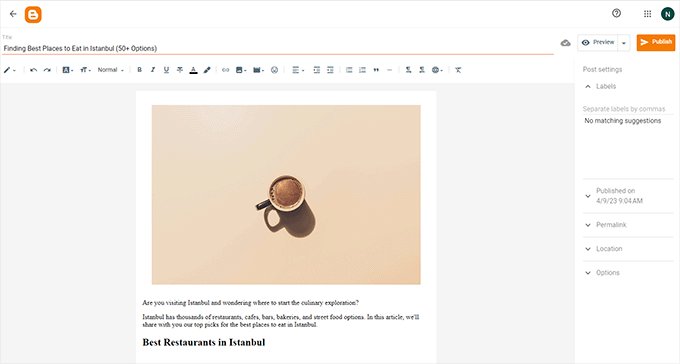
Pros
- Blogger is free, which is a major draw for beginners.
- It’s easy to use and manage, requiring absolutely no technical skills to get your blog up and running.
- Has the added advantage of Google’s robust, secure platform and their renowned reliability.
Cons
- You’re limited to basic blogging tools and can’t add new features as your blog grows in popularity. That said, this isn’t the most scalable blogging platform.
- Design options are quite limited, with fewer official templates available. In addition, third-party templates for Blogger are often low quality and can be difficult to work with.
- Blogger does not receive frequent updates or new features.
- Google can suspend your blog at any time, or even discontinue the Blogger service without warning. (Google does have a history of abandoning projects without notice, such as FeedBurner.) That said, it’s not a great blogging platform if you want full control and ownership over your content.
For a more detailed look at the pros and cons of Blogger, I recommend checking out our comprehensive comparison of WordPress vs Blogger (Pros and cons).
Just like with WordPress.com, I’ve noticed that some users start out with Blogger because it’s free. However, as their blog grows, many end up switching from Blogger to WordPress to get more features and control over their website.
Pricing
Blogger is free to use with a Blogger subdomain, such as https://example.blogspot.com. If you want to use a custom domain, then you’l need to purchase it separately from a third-party domain registrar.
8. Medium

Launched in 2012, Medium has grown into a community of writers, bloggers, journalists, and experts. It is an easy-to-use blogging platform that also includes some limited social networking features.
Medium functions very similarly to a social networking site where you can create an account and start publishing your articles right away.

After you sign up, you’ll have a profile address like this: https://medium.com/@yourname. However, it’s important to note that you cannot use your own custom domain, which is a key difference from other blogging platforms.
Pros
- Medium is easy to use, with no setup required and absolutely no coding skills needed, so you can focus on your writing.
- Uniquely, Medium comes with a built-in audience. This means you can potentially boost your reach really quickly.
- You can concentrate on creating valuable content instead of managing technical tasks, like designing your website.
Cons
- Features are very limited, particularly when it comes to customizing your design and establishing your brand. This is a big drawback compared to some other blogging platforms on my list.
- Medium essentially owns your audience, so losing your blog would also mean losing all your followers.
- You cannot use your own domain name. You’ll simply get a profile page like on Facebook, e.g. https://medium.com/@yourname. This really does limit your professional branding.
- You cannot run your own ads because monetization is limited to Medium’s partner program. This restricts your earning potential, especially when compared to some other blog platforms.
For a more detailed comparison, see our guide on WordPress vs Medium – which one is better?
Pricing
Medium is free to use.
While the platform looks attractive at first due to its simplicity, the lack of monetization and control means that most people eventually switch from Medium to WordPress.
9. Squarespace
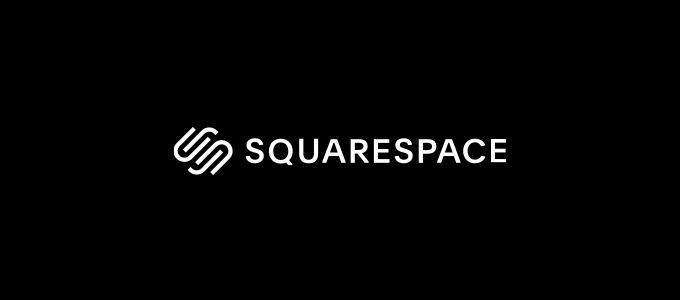
Squarespace is a premier website-building service that lets you create beautiful websites using easy drag-and-drop tools. It’s a great choice for small business owners who are looking for an easy way to establish a professional online presence.
Started in 2003, Squarespace currently powers millions of websites online, making it one of the most popular blogging platforms on the market (source: CMS market share).
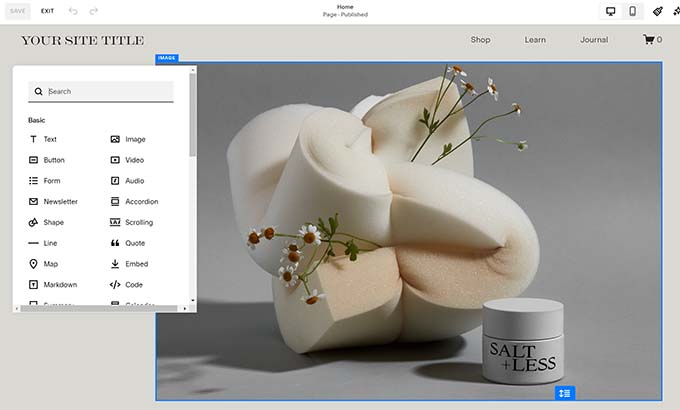
Pros
- Squarespace is simple and easy to use for beginners who aren’t very tech-savvy.
- It has beautiful, professionally designed templates that give your website an immediate, polished appearance.
- It conveniently offers services like domain names with SSL/HTTPS encryption and comprehensive eCommerce stores.
Cons
- With Squarespace, you’re limited to the features built into their proprietary platform. This means much less flexibility compared to open-source blogging platforms.
- Integrations are limited to a select few services and tools. This will almost certainly restrict your blog’s capabilities as it grows.
See our guide on WordPress vs Squarespace for a more detailed comparison.
Pricing
Squarespace offers different pricing plans tailored for various types of websites and online stores.
Pricing for their Personal plan starts at $23 per month, or a more affordable $16 per month if you pay annually. For the Business plan, pricing starts at $33 per month, or $23 per month when billed annually.
Meanwhile, pricing for dedicated online stores starts from $27 per month, and goes up to $49 per month.
Once again, I’ve seen many people end up switching from Squarespace to WordPress. This move is typically driven by two key factors: the need for more features and the goal of lowering ongoing costs, since Squarespace is one of the more expensive blogging platforms on this list.
10. Ghost

Ghost is a minimalist blogging platform with features entirely focused on writing blog posts, sending newsletters, and offering memberships.
Ghost started in 2013, and it’s available as both a hosted platform and software that you can install and host yourself. We’ll take a look at both options.
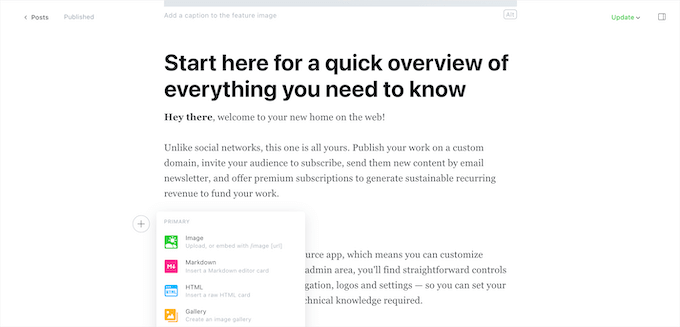
Pros
- Ghost is highly focused on pure blogging and writing, providing a streamlined environment for creating content.
- It offers a remarkably clean, clutter-free, and intuitive user interface.
- Written in JavaScript, so it’s super fast.
- For the hosted version, absolutely no setup is required so you can start publishing right away.
Cons
- Ghost isn’t easy to customize with third-party apps or extensive integrations. This makes it fairly restrictive, compared to other blogging platforms.
- The simplified user interface, while clean, means that you’re pretty limited when it comes to customizing your blog.
- Not enough themes available to change how your site looks.
- The setup process can be quite complicated if you choose to install Ghost yourself.
Take a look at our comparison of WordPress vs Ghost for more insights on these two blogging platforms.
Pricing
For the self-hosted version, you will need a custom domain (typically about $14.99 per year) and web hosting (starting from around $7.99 per month).
Pricing for the hosted version starts at $9 per month for 1 staff user with a 500 member limit. Unless you buy a custom domain from a third-party domain registrar, your blog will operate on a Ghost subdomain, ending with ghost.io.
11. Weebly

Weebly is a well-known website builder platform owned by Square. They offer straightforward, easy-to-use website-building tools that are ideal for business websites and eCommerce stores.
They also include a dedicated blog feature along with free blog templates that you can seamlessly add to your website.
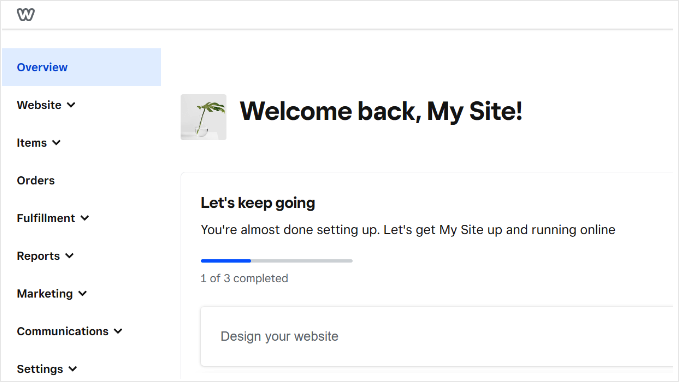
Pros
- Fully hosted website and blogging platform.
- Seamless integration with the Square payment platform. This is a big advantage if you want to sell things online.
- No setup required for the hosted version, so you can create a blog right away.
Cons
- Free plan has limited features and bandwidth. It also includes Weebly branding, which will make your blog seem less professional.
- Paid subscriptions can be quite expensive when compared to other top blogging platforms that offer more extensive features.
- Blogging and SEO features are not as powerful as WordPress.
Want more information? Then take a look at our Weebly vs WordPress post, where we compare these two popular blog platforms.
And if you want to switch to WordPress, then we’ve also created a detailed step-by-step tutorial on how to properly move from Weebly to WordPress.
Pricing
They have a limited free version that comes with Weebly branding and ads.
Their paid plans start from $10 per month billed annually. The Professional plan costs $12 per month, and their Performance plan costs $26 per month.
My Pick for the Best Blogging Platform
Based on all my research and years of experience, I believe that WordPress.org outperforms all other blogging sites. It is powerful, easy to use, and affordable.
Plus, it stands out as the most flexible of all the available blogging platforms, so it can truly grow with your blog. I’ve actually written an entire post covering all the reasons why you should use WordPress.
To help you start your own WordPress site, I’ve created a complete guide on how to start a blog.
If you need more help, then WPBeginner’s dedicated team of experts can set up your blog for free! You can learn more about our free WordPress blog setup service.
If you’re specifically looking for a WordPress alternative, then my top choices for the best blogging platform are Hostinger Website Builder and Wix. Their intuitive drag-and-drop website builders make it incredibly simple to create any type of website, from blog to business site, or even an online store.
Video List
If you’d rather watch a video to learn about my top picks for blogging platforms, check it out:
Disclaimer: I also tried many other blogging platforms that are not listed in this article like Tumblr, LinkedIn, Joomla, Drupal, and others. But I decided it wasn’t best to include them because I don’t want to cause choice paralysis.
Best Blog Platforms: FAQs
At WPBeginner, I’m incredibly proud that we’ve helped over 2 million users successfully launch their websites.
During that time, we’ve naturally answered quite a lot of questions. Below, I’ve collected some of the most frequently asked questions about blogging platforms, so you can get the information you need, fast.
Which is the best blogging platform for SEO?
Based on all my research and experience, WordPress is by far the best blogging platform for SEO.
WordPress is optimized for the search engines by default, but you can also install powerful SEO plugins such as All in One SEO. AIOSEO can significantly improve your blog’s rankings – in fact, we use this plugin to optimize every single page and post across WPBeginner!
You can learn more, by checking out our detailed AIOSEO review.
When it comes to improving your search engine rankings, no other blogging platform gives you the same level of flexibility, control, and powerful capabilities that WordPress does. It truly stands out as the best blog platform for SEO.
Which is the best free blogging platform?
While many blogging platforms I’ve tested offer a free version, in my expert opinion WordPress.org stands out as the best free blogging platform. After all, there’s a reason why over 43% of all websites use WordPress!
However, it’s important to understand that while WordPress is free, you still need a domain name and web hosting. Both of these things cost money.
A domain is your website’s name on the internet (like wpbeginner.com), and web hosting is where your files are securely stored.
Some other blogging platforms like Blogger or Medium offer free hosting. However, they often put unwanted advertisements on your site, which isn’t ideal for serious bloggers. They also severely limit your control and customization options, so you may struggle to create exactly the blog you want.
This is why I recommend making a small, smart investment of $1.99 per month. This allows you to fully host and own your WordPress.org blog using Bluehost, who are a reputable hosting provider.
This small cost gives you complete freedom and control, so you can build a truly professional and future-proof blog.
For a deeper dive into why WordPress is free, you might also want to explore my guide on why WordPress is free and what the catch is.
What platforms do most bloggers use?
According to my blogging research data, the answer is incredibly clear: the vast majority of bloggers use WordPress to create their blog. In fact, this powerful blogging platform now powers over 43% of all websites across the internet.
The sheer volume is also impressive: people publish over 70 million new blog posts on WordPress every single month! This widespread adoption really does solidify WordPress as the best blog platform.
You may also find my history of blogging article helpful to better understand how various blogging platforms have evolved over time.
How can I make my blog popular?
In my experience, the best way to make your blog popular and grow your audience is by consistently creating high-quality, valuable content and promoting it across social media platforms.
The key is to genuinely understand the challenges and questions your target audience has, and then provide clear, helpful solutions through your blog posts. This focus on solving problems is what truly resonates with readers.
To help you out further, I’ve created an ultimate guide on how to increase your blog traffic with 27 proven tips that you should check out. It covers everything you need to know about growing a successful blog.
Which blog topic is the best for earning money?
In my experience, you can make money with almost any blog topic as long as you have an audience. However, it’s certainly true that some blogging niches tend to be more profitable than others.
Based on my research and years of experience, the top blog topics for earning money online include:
- Health & Fitness
- Personal Finance
- Fashion
- Lifestyle
- Business & Marketing
- Travel
These areas consistently get a lot of audience interest and offer significant monetization opportunities across various blogging platforms.
For even more ideas, check out my guide to the best blogging niches along with these proven tips to monetize your blog.
What is the best time to publish a blog post?
According to research and studies, the best time to publish a blog post for maximum traffic is Monday around 11 a.m. EST.
However, in reality I’ve found that the answer varies depending on your audience and their location. For example, if the majority of your audience is in Australia, then 11 a.m. EST certainly wouldn’t be the best time to try and reach them!
Understanding your audience’s unique habits is key to success on any blogging platform.
To help you create your perfect publishing schedule, I’ve put together a detailed guide on how to test the best publishing time for your blog. I highly recommend checking it out!
How long does it take before a blog becomes popular?
Too often, beginners start a blog and expect immediate, overnight success.
Based on my experience, most blogs take at least 7-8 months before they start seeing a decent amount of visitors. The most significant, lasting results typically start to appear after 2-3 years of consistent work.
This is also true for just about any kind of creator-based business, whether you’re building a YouTube channel or launching an online course.
While there are certainly rare exceptions where a creator achieves instant viral success, this isn’t the norm.
For example, consider the WPBeginner blog itself. It’s now recognized as one of the highest-earning blogs on the planet, but I started it way back in 2009 and spent years building our audience. For complete transparency and more insights into our journey, you can see the WPBeginner income report.
How many times a week should I blog?
In my experience, it’s important to publish frequently – but consistency is far more important. Above all else, you want to establish a regular schedule that you can stick to.
I always recommend that you start by consistently publishing just one blog post per week. If you can maintain that pace for 3 weeks in a row, then you might consider increasing it to 2 posts, and gradually ramp up from there. The goal is steady progress, not burnout.
At WPBeginner, we publish 3 days a week (Monday, Wednesday, and Friday), but that’s a result of years of consistent effort.
On other business blogs I manage, my team might only publish 1 high-quality blog post a week.
The ideal frequency ultimately depends on your resources and audience, regardless of the blogging platform you choose.
What are the top 3 best blog platforms for beginners?
When it comes to the best blogging platforms for those just starting out, I carefully selected my top 3 to provide excellent balance between ease of use, control, and growth potential.
That said, here are my personal recommendations for the best blogging platforms for beginners:
- WordPress – This is my ultimate recommendation and truly the best blogging platform overall. While it’s a self-hosted solution, it offers a ton of flexibility and complete control over your blog’s future, making it the ideal choice for serious bloggers who want to own their content and grow without limitations.
- Hostinger Website Builder – For those seeking a highly intuitive, low-cost alternative to WordPress, the Hostinger Website Builder is an excellent blogging platform. It provides a straightforward website-building solution that’s perfect for small businesses and individuals looking to create a blog quickly.
- Wix – Another fantastic, user-friendly website builder that offers robust blogging capabilities. It serves as a strong WordPress alternative for beginners who need a drag-and-drop, all-in-one solution for their website or blog.
I hope this article helped you choose the best blogging platform for your next blog. You may also want to see my guides on how to create an email newsletter to grow your blog subscribers and how to create a business email address for your blog.
If you liked this article, then please subscribe to our YouTube Channel for WordPress video tutorials. You can also find us on Twitter and Facebook.





FrankPereiro
Hi there, I have a huge problem with my WordPress hosted blog. Hackers can easily enter into my server and get rid of my blog files. It has happened several times already and it’s really frustrating.
Do you have any tips for this problem? I have to start a new blog, again.
Regards,
WPBeginner Support
For our security recommendations for WordPress, you would want to take a look at our article below: https://www.wpbeginner.com/wordpress-security/
Admin
anshula
This post was very helpful .
WPBeginner Support
Glad our guide was helpful
Admin
Osagie Iyayi
Great post !
I got value..
A question though ; does WordPress allow Google AdSense ?
WPBeginner Support
Glad our post was helpful, WordPress.org sites allow Google Adsense
Admin
B. Palmer
This article was extremely helpful. Also, thank you for the hyperlinks for extra information.
WPBeginner Support
Glad our recommendations were helpful
Admin
E Luis De La Rosa
This was a very helpful and informative article! I was just curious about which platform you would consider to be the best free alternative to wordpress.org. I would love to eventually use it but for now my finances don’t really allow for too much more. Thank you!
WPBeginner Support
For a starting point, you can look at WordPress.com as they are using WordPress but with more restrictions
Admin
Smishhra
Very informative post,really liked this post… Thanks for sharing.
WPBeginner Support
You’re welcome, glad you found our guide informative
Admin
S Mishra
Thank you for this wonderful & helpful post.
WPBeginner Support
You’re welcome, glad our guide was helpful
Admin
Sanjay Mishra
I just want to say thanks for your wonderful post…
WPBeginner Support
You’re welcome, glad you liked our post
Admin
Danny
Hi,
Thanks for sharing the information.
WPBeginner Support
You’re welcome
Admin
BoTree Digital
Thanks for sharing this. It will help us to publish content.
WPBeginner Support
Glad you found our content helpful
Admin
citcchandigarh
thank you for this article.
WPBeginner Support
You’re welcome
Admin
George
Great blog. Thanks for sharing.
WPBeginner Support
Thank you and you’re welcome
Admin
Robin
Very good porst.
WPBeginner Support
Thank you
Admin
Eemu
Amazing blog.
Its very useful.
WPBeginner Support
Thank you, glad you found our content helpful
Admin
Kara
So…. clearly this is geared toward wp. However, I find wp extremely clunky and difficult to make my blog as visually appealing as I would like. I don’t get it, I love the ease of drag and drop (I took coding classes in college, many moons ago) not interested in going back. I absolutely love wix for my business sites… but blogging is rough on that. I want the best of both worlds. Tips?
WPBeginner Support
For drag and drop control over your content with WordPress, you would want to take a look at page builder plugins: https://www.wpbeginner.com/beginners-guide/best-drag-and-drop-page-builders-for-wordpress/
Admin
Yoriko Otomo
Hi,
A very well written article, Easy to understand and helpful.
WPBeginner Support
Thank you, glad you found it helpful
Admin
Raphael Wichtl
Such a great and very much informative information. Thanks for this update and keep sharing this type of helpful article!
WPBeginner Support
Thank you, glad you like our article
Admin
Palash Moundekar
This information is very useful to me. I would like to implement this information for improve our work. Thank you for sharing crucial information with us.
WPBeginner Support
Glad you found our content helpful
Admin
Martha Santos
I have a question for you. Is there any blogging platform that is better for blogs with written text? I am currently using Tumblr and I like how easy it is to use but I find that most of what everybody posts there is images and very little text. I am not sure people are that interested in reading written texts. Do you have any advise on this? Or are all blogging platforms more oriented towards images than writing anymore?
WPBeginner Support
Most sites add the images to make sharing the content more social media friendly but any of the other platforms should be good for writing.
Admin
anishiiadm
As a matter of first importance, I might want to you rock for composing such informative content. I arrived, what I needed.
WPBeginner Support
Glad you like our content
Admin
Kyle
Thanks much for this
WPBeginner Support
You’re welcome
Admin
jenifferjack
thanks for sharing this information with us
WPBeginner Support
You’re welcome
Admin
Emily
Hello – Thank you for creating this article! I don’t have any real networking connections, so I’m wanting to build up my writer’s portfolio before making my freelancing website public and all that. I felt that blogging would be a great asset in that regard. Do you have any tips on how to spread or market a blog and gather a wider audience? And would it be smart as a beginner to have a few posts already written beforehand and post them at regular intervals as you write new material?
WPBeginner Support
For getting a larger audience you would want to take a look at our article here: https://www.wpbeginner.com/beginners-guide/how-to-increase-your-blog-traffic/
Having some posts prepared to allow you to keep a consistent posting schedule would be good for a beginner
Admin
Kim
Hi,
I’m currently using Wix and getting super frustrated, as I cant get any embeds or links to work, as of late. I also cant find where to contact them for help. Very frustrating!! I’m considering switching to a different platform. Is there one in particular that you suggest that will be relatively easy to transfer my content over to?
WPBeginner Support
We are a bit biased toward WordPress, if it helps we have a guide explaining the transfer process here: https://www.wpbeginner.com/wp-tutorials/how-to-properly-switch-from-wix-to-wordpress-step-by-step/
Admin
Kimo Paul
Such a valuable information in this blog its really help me in the future.
WPBeginner Support
Thank you, glad our guide can be helpful
Admin
robert
Thank you for comparing popular blogs. I have a somewhat granular question based on your analysis. The only blog you mention that is SEO friendly is Wordpress. I’m looking for the best blog platform for SEO – ease of tile tags, descriptions, on-page linking. Which platform do you recommend for SEO?
WPBeginner Support
As a WordPress tutorial site, our opinion is biased toward WordPress being the best solution for that
Admin
Divyang Bhuva
Hey,
I found all the discusions really useful in terms of applications for blogging that I haven’t really ever considered!
I found your write up really helpful, that I made a full note out of it. Thank you so much.
WPBeginner Support
Glad our article could be helpful
Admin
Terry Watkins
I like the idea of using WP.org but not the idea that WP.com would OWN my work. Please explain what this means. At some point I may want to publish my writing. How would that work?
WPBeginner Support
If you use a WordPress.org site then it is not a WordPress.com site. For some clarification, you may want to take a look at our article here: https://www.wpbeginner.com/beginners-guide/self-hosted-wordpress-org-vs-free-wordpress-com-infograph/
Admin
Raj Sinha Roy
Amazing write up. Eliminates the frustrating initial research and greatly facilitates in decision making.
WPBeginner Support
Thank you
Admin
Aisha sharma
Awesome blog. Thanks for sharing it.
WPBeginner Support
You’re welcome
Admin
yogesh
These post was really helpful for mo
Robby
This is what I’ve been searching and looking for. Thanks for the article, its really helpful.
WPBeginner Support
Glad our article could be helpful
Admin
Kamaljeet Singh
Finally, I found the perfect article that helped me choose the best blogging platform. Thanks to beginner.
WPBeginner Support
Glad our article could help
Admin
Lorna Pollock
I’m looking for a free blog – but I already have a domain name and a hosting company. Is there such a thing?
WPBeginner Support
If your host allows, you should be able to install WordPress for free and point your domain toward the site.
Admin
techsteeds
I want to big thanks for sharing wonderful list Nice work
WPBeginner Support
Thank you, glad you like our content
Admin
Nihal Singh
Great post!
It is most useful for the content writer to publish the article for the audience. The given blogging platform is very helpful for writing the best content. Thank you for sharing.
WPBeginner Support
Thank you, glad you find our content helpful
Admin
Dilip
Hi, so I am about to start blogging and I am working on my content to avoid any breaks later,however I am concerned about security of my blog. Its a Food Blog that I am working on. Please advice on security of my blog if I do go ahead with Wordpress.org or wordpress.com.
cheers.
WPBeginner Support
For a WordPress.org’s site security, you would want to take a look at our article here: https://www.wpbeginner.com/wordpress-security/
Admin
Johanna Oznowicz
I had to stop using blogger because I couldn’t get rid of the COMMENTS page for the content I had. So I ended up having to erase the whole post.
NOW, I live in fear of having to delete my Wordpress page because of the new format they’re going to, which will mess with paragraphs, to where I will lose at least half a post.
I am seriously considering just creating my own personal blog with Word . Just writing as a journal. But the whole point of having a blog is to make yourself heard. HOW can I do that when the changes botch up what work I’ve already done? FRUSTRATION!
WPBeginner Support
If how the blocks are styled concerns you, and you know about the classic editor plugin, you should still be able to use the classic block in your posts and pages to create content using that method
Admin
Sahil Singha
Hello Sweet,
I’m Very Happy to advice From you, To Choose Best One. I Gonna To start WordPress.org that it’s good Blog yeah!
Sorry, I start My Blog After Getting new smartphone last 2019 in it…
I hopefully to help me To grow
Thanks you, So much
☺☺See You later☺☺
WPBeginner Support
You’re welcome
Admin
Biprojit Deb
I choose blogger because its easy for me
WPBeginner Support
If you feel it is the best platform for you then great, glad you found the platform you prefer
Admin
Vero
Thank you so much for taking the time to write this blog. I am familiar with most of the platform as I have used it in the past. I am currently using WP.com, I don’t want to self-host. But I am wondering how do I start generating income on blogging with wp.com? I know it will take some time. But I wanted to make sure that I am using the right platform that will be generating income from my blog. It is a paid one, not a free one since I upgrade it.
WPBeginner Support
You would want to reach out to WordPress.com’s support for what monetization options they have available at the moment.
Admin
Hannah Carim
best blog ever thanks for sharing
WPBeginner Support
You’re welcome
Admin
cdsmythe
HI there
Im looking for a blog provider where I can restrict access – so I can issue usernames and passwords for access.
Which of the platforms you covered provide that as a feature?
WPBeginner Support
With WordPress you could use a membership plugin to do that: https://www.wpbeginner.com/plugins/5-best-wordpress-membership-plugins-compared/
Admin
Gail S
I’ve had a Blogger blog for a few years now. I’m now having to find another platform as we’ve been notified that Google’s Blogger (Blogspot) goes away April 2, 2019.
I’ve looked around and most of these free sites listed seem harder to figure out than Blogger did. I hope to find something I like soon. The info was good here, but over my head in many respects.
WPBeginner Support
Unless we hear otherwise, Google is not shutting down Blogger at the moment. They are removing Google+ and Google+ for comments from Blogger sites April 2nd, 2019. Your Blogger site will remain it will only lose Google+ comments.
Admin
Stuff Place One
good post and it really help
WPBeginner Support
Thank you, glad it could help
Admin
Al-Burraq Technologies
nice post thanks for sharing such a wonderful post
WPBeginner Support
Glad you like our content
Admin
kaalsatyanarayan ji
best site best blog thanks sir
WPBeginner Support
Thank you
Admin
Joe
well, I would like to know where WP is better than most. So far all I noticed was how quick we can install it. After that you are entirely on your own. No one (unless you pay large amounts of money) will support you and most themes I chose so far, unless I buy them outright, do not work properly. Perhaps that is good for rich people but not for people like me. I pay when I am happy with the goods I am using. If you buy a shirt you try it out. Works? Like it? Then you buy it. Although I also do not like WIX.com, I think it is still a much better option . All the rest are just plugins. the essence of Site building lies on the fact the it is all HTML.
Here your article is a sales pitch on your services and those of WP: bah shame on you!
WPBeginner Support
For receiving support for WordPress, you can contact us but for specific themes and plugins to understand why some of them require payments for support you may want to take a look at our article: https://www.wpbeginner.com/beginners-guide/how-to-properly-ask-for-wordpress-support-and-get-it/
The support forums on WordPress.org are where you would find free assistance for themes and plugins.
Admin
Laura
I think that’s the point of the blog; and the whole point of blogging. WP Beginne is obviously an expert in their field, an evangelical supporter of WP and happy to extend their knowledge and experience of the site to viewers and readers of their blog. Adding value to their business and extending that value to their consumers. No on asked you to read it love. Raise your vibe or move along.
Surya Singh
Very Useful sites thanks for sharing it
WPBeginner Support
Glad our article could be helpful
Admin
Asif
Nice post.
Thank you for sharing a informative information with us
WPBeginner Support
Glad you found our content helpful
Admin
Tony Loring
“Drag and drop”? Where does the user drag from, and drop where? Too many terms are bandied about NOT allowing ease to use the sites. How to upload text is a similar problem. Terms don’t correspond so the user is left staring blankly into space wondering “How do I resolve this dilemma?” One site says “Click to the left of the Editor”. Problem is, nothing happens on doing that. Another “suggestion” is “click on the black bar at the top of the page”. However, NO black bar is there!
Sensible directions must be explicit and clear. Example: “First click on this; then go to that etc.”
I sometimes feel, where literary sites are concerned, the idea is to shoo away the possible user! This is most frustrating!
Also, beware of “experts” or terms like “the best”. The first simply means gouger, and the 2nd term really means THE WORST!!
WPBeginner Support
For clarification, this is a comparison article, not an article explaining how to use the functions in each of these services. If you are looking for support for how to use something in WordPress you can reach out to us through our contact form.
Admin